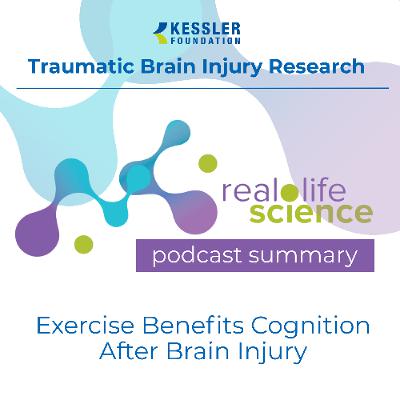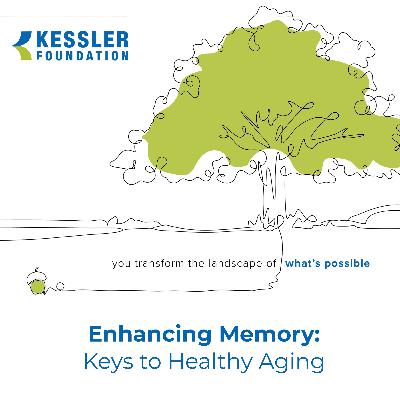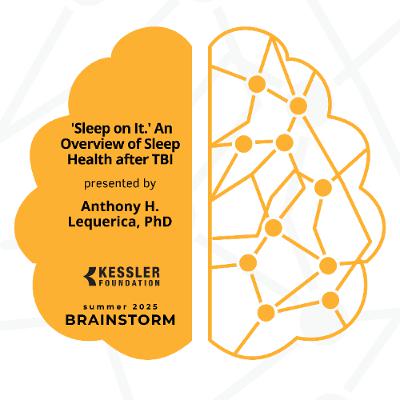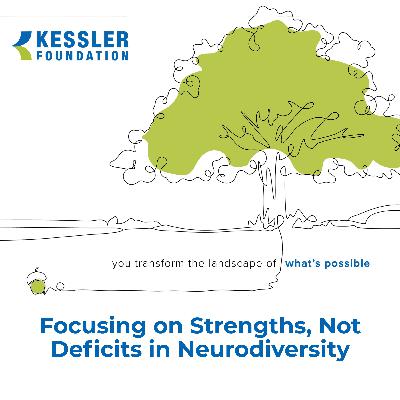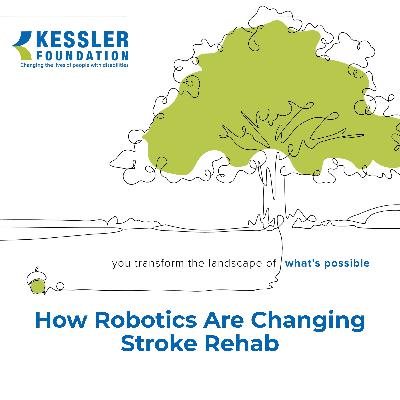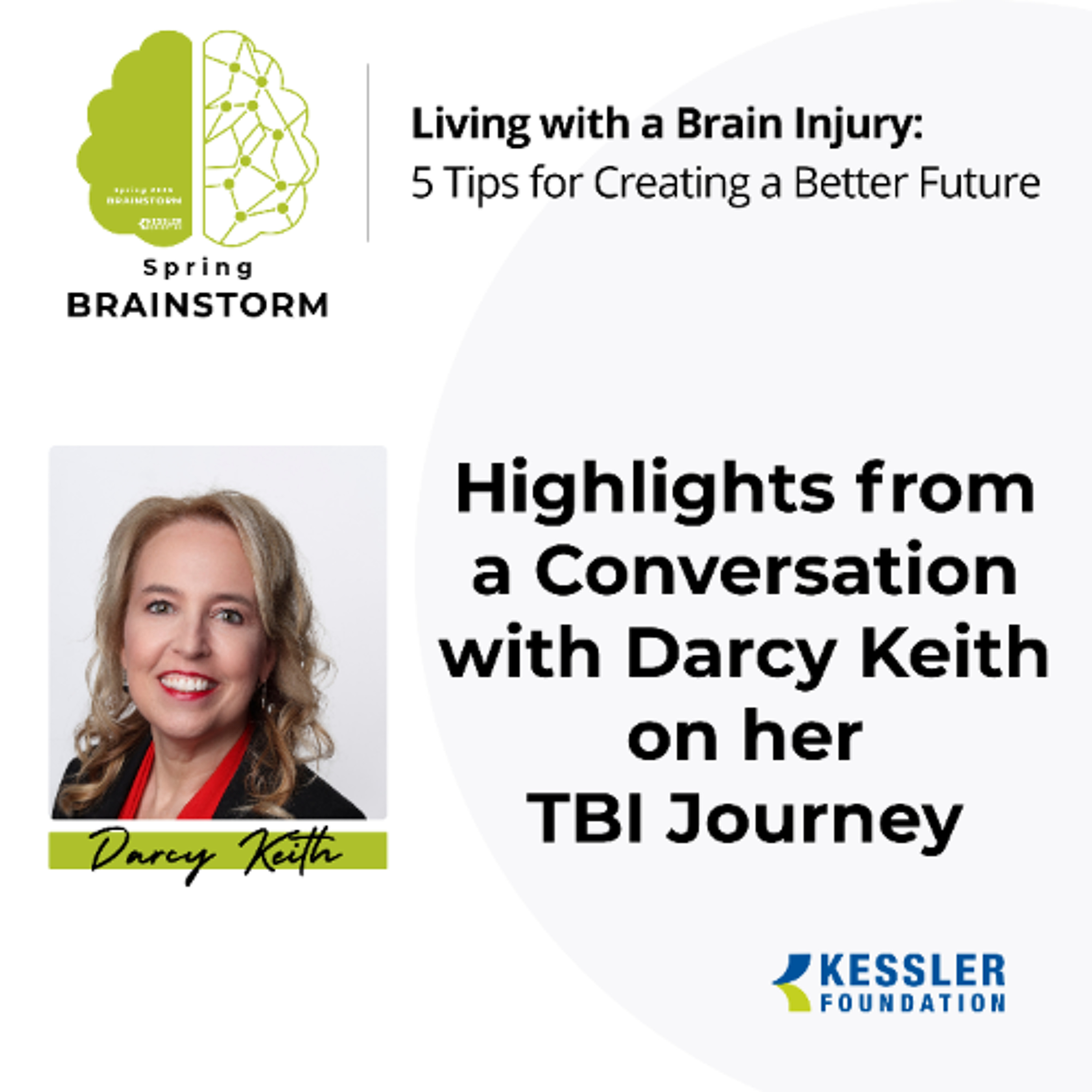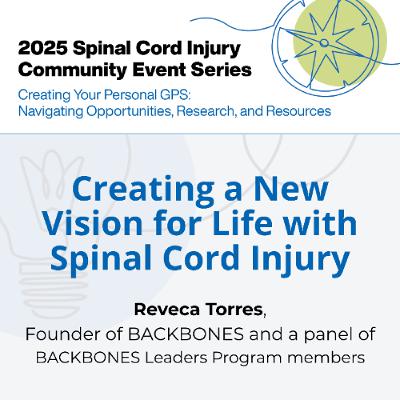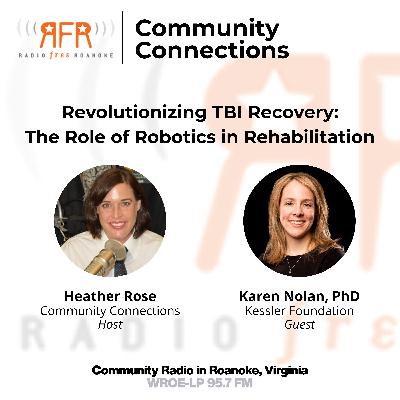Discover Kessler Foundation Podcasts
Kessler Foundation Podcasts

Kessler Foundation Podcasts
Author: Kessler Foundation
Subscribed: 62Played: 813Subscribe
Share
© All rights reserved
Description
Kessler Foundation - Changing the lives of people with disabilities through research in stroke, brain injury, multiple sclerosis, spinal cord injury and by funding innovative programs that promote employment for people with disabilities. Podcasts are from various consumer and professional lectures presented by our researchers and guest lecturers.
368 Episodes
Reverse
Michele Pignatello, Chief Development Officer and Vice President, Development and Communications at Kessler Foundation, spoke to Radio LoRa Switzerland about our work to improve quality of life for people with disabilities through discovery, innovation, demonstration, application, and dissemination.
LEARN more about Kessler Foundation, https://kesslerfoundation.org/about-us
Make a Gift, https://kesslerfoundation.org/?form=GiveKessler
Used with permission: Radio LoRa Switzerland
www.facebook.com/LoRa97.5
www.instagram.com/radiolora97.5
People with progressive multiple sclerosis often experience slowed cognitive processing speed. Researchers from Kessler Foundation analyzed data from the international CogEx trial, involving over 300 participants using brain training and exercise over 12 weeks. They found that improvement in cognitive speed varied, with better memory and higher pre-symptom IQ predicting greater gains. Factors like age, gender, or disability status did not affect outcomes. These findings highlight the need for personalized rehabilitation tailored to individuals’ cognitive profiles, moving beyond one-size-fits-all treatments.
=====================================================================================
Kessler Foundation Investigators:
Lead: Brian Sandroff, PhD
https://kesslerfoundation.org/about-us/foundation-staff/brian-m-sandroff-phd
=====================================================================================
READ this journal article:
“Correlates of Processing Speed Change With Combined Cognitive Rehabilitation and Exercise in Progressive MS: Secondary Analysis of the CogEx Trial,” was published in Neurorehabilitation & Neural Repair (2025), https://journals.sagepub.com/doi/10.1177/15459683251331586
PARTICIPATE:
Interested in participating in our research remotely or in-person? Go to https://kesslerfoundation.org/join-our-research-studies
LISTEN to more Real-Life Science Summaries:
https://soundcloud.com/kesslerfoundation/sets/real-life-science
This Real-Life Science summary is part of our series that translates peer-reviewed research into practical, real-world understanding.
=====================================================================================
LOOKING FOR MORE PODCASTS?
Join our listeners in 90 countries who enjoy learning about the work of Kessler Foundation. Subscribe to our SoundCloud channel, “KesslerFoundation,” for more research updates.
This podcast was recorded, produced, and edited by Joan Banks-Smith, Sr. Creative Producer at Kessler Foundation in December 2025.
=====================================================================================
Kessler Foundation uses AI voices and narrators to make our media more accessible. These tools help ensure people with visual or cognitive impairments can access our materials. Automated voices may not always capture intonation or pronunciation as clearly as the accompanying text. If you experience issues with our AI narrators, please contact us at communications@kesslerfoundation.org.
Nearly two-thirds of autistic adults face unemployment, often due to workplace misunderstandings around communication styles rather than ability. This episode explores research from Kessler Foundation that uses a novel voicemail elicitation task to assess polite language use among autistic youth in mock work scenarios. Discover how perceived impoliteness arises from pragmatic differences in language and what this means for job interviews, teamwork, and employee relationships. Learn practical tips for autistic individuals preparing for employment and strategies employers can implement to foster better understanding and inclusion.
=====================================================================================
Kessler Foundation Investigators:
Lead: Heba E. Elsayed, MD
https://kesslerfoundation.org/about-us/foundation-staff/heba-elsayed-md
=====================================================================================
READ this journal article:
“Voicemail Elicitation Task: Potential workplace communication assessment tool for autistic individuals” (Research in Autism, 2025) doi.org/10.3389/fresc.2025.1539887.
EXPLORE our autism research:
https://kesslerfoundation.org/research/center-for-autism-research
LEARN more about KF-STRIDE, https://kfstride.org
PARTICIPATE:
Interested in participating in our research remotely or in-person? Go to https://kesslerfoundation.org/join-our-research-studies
LISTEN to more Real-Life Science Summaries:
https://soundcloud.com/kesslerfoundation/sets/real-life-science
=====================================================================================
LOOKING FOR MORE PODCASTS?
Join our listeners in 90 countries who enjoy learning about the work of Kessler Foundation. Subscribe to our SoundCloud channel, “KesslerFoundation,” for more research updates.
This podcast was recorded, produced, and edited by Joan Banks-Smith, Creative Producer at Kessler Foundation in December 2025.
=====================================================================================
Kessler Foundation uses AI voices and narrators to make our media more accessible. These tools help ensure people with visual or cognitive impairments can access our materials. Automated voices may not always capture intonation or pronunciation as clearly as the accompanying text. If you experience issues with our AI narrators, please contact us at communications@kesslerfoundation.org.
Opinion: Why Cognitive Care in MS Needs a Team Approach
By John DeLuca, PhD, Senior Vice President, Research and Training, Kessler Foundation
This episode shares expert opinion on how cognitive changes in multiple sclerosis should be understood and treated. Changes in thinking and memory are complex and can be affected by many factors, such as mood, heart and blood vessel health, and daily lifestyle habits.
Based on the work and clinical perspective of Dr. John DeLuca and colleagues, the episode argues that an interdisciplinary care approach where professionals work together as one coordinated team may be more effective than traditional multidisciplinary care. This type of teamwork supports a fuller understanding of each person’s cognitive needs.
=====================================================================================
Kessler Foundation Investigators:
Lead: John DeLuca, PhD,
https://kesslerfoundation.org/about-us/foundation-staff/john-deluca-phd
=====================================================================================
READ this journal article:
“Controversies in Multiple Sclerosis: An interdisciplinary approach is necessary in the treatment of cognitive decline in multiple sclerosis,” published in Multiple Sclerosis Journal (2025). doi:10.1177/13524585251315357.
PARTICIPATE:
Interested in participating in our MS research remotely or in-person? Go to https://kesslerfoundation.org/join-our-research-studies
LISTEN to more Real-Life Science Summaries:
https://soundcloud.com/kesslerfoundation/sets/real-life-science
This Real-Life Science summary is part of our series that translates peer-reviewed research into practical, real-world understanding.
====================================================================================
LOOKING FOR MORE PODCASTS?
Join our listeners in 90 countries who enjoy learning about the work of Kessler Foundation. Subscribe to our SoundCloud channel, “KesslerFoundation,” for more research updates.
This podcast was recorded, produced, and edited by Joan Banks-Smith, Senior Creative Producer at Kessler Foundation in December 2025.
=====================================================================================
Kessler Foundation uses AI voices and narrators to make our media more accessible. These tools help ensure people with visual or cognitive impairments can access our materials. Automated voices may not always capture intonation or pronunciation as clearly as the accompanying text. If you experience issues with our AI narrators, please contact us at communications@kesslerfoundation.org.
In this episode, we discuss research exploring how storytelling and mental imagery techniques can improve memory in older adults with mild cognitive impairment or normal aging. A 5-week study with 30 participants showed that specialized memory training led to significant improvements in lab-based tests and everyday recollections.
These findings suggest non-pharmacological strategies could help older adults maintain mental sharpness and independence. We also explore whether this training could delay dementia and the benefits of earlier intervention.
READ the full study, Dementia and Geriatric Cognitive Disorders Extra (2025), https://pubmed.ncbi.nlm.nih.gov/40093355
LEAD INVESTIGATOR: Nancy D. Chiaravalloti, PhD, https://kesslerfoundation.org/about-us/foundation-staff/nancy-chiaravalloti-phd
LEARN MORE ABOUT OUR RESEARCH: https://kesslerfoundation.org/research/center-neuropsychology-and-neuroscience-research
READ all our Real-Life Science summaries, https://kesslerfoundation.org/newsletter/real-life-science
LISTEN to all our Real-Life Science summaries, https://soundcloud.com/kesslerfoundation/sets/real-life-science
EXPLORE our cognition research, https://test-kessler-foundation-https://kesslerfoundation.org/research/cognition
PARTICIPATE: Interested in participating in our research remotely or in-person? Go to https://kesslerfoundation.org/join-our-research-studies
Production Notes
This podcast was recorded, produced, and edited by Joan Banks-Smith , Creative Producer at Kessler Foundation (December 2025).
Accessibility
Kessler Foundation uses AI voices and narrators to make our media more accessible. These tools help ensure people with visual or cognitive impairments can access our materials. Automated voices may not always capture intonation or pronunciation as clearly as the accompanying text. If you experience issues with our AI narrators, please contact us at communications@kesslerfoundation.org.
In an interview with Radio LoRa Switzerland, Dr. Trevor Dyson-Hudson spoke about aging with spinal-cord injury, later onset, and the chronic pain and other conditions and injuries that could develop as a result.
Dr. Dyson-Hudson discussed why aging with spinal-cord injury has become a central clinical and research priority. He mentioned that the average age of people with spinal cord injury onset has increased from 29 years in the 1970s to 44 years in the current decade. We are seeing a higher percentage of older cases now."
LEARN more about Dr. Dyson-Hudson, https://kesslerfoundation.org/aboutus/Trevor%20Dyson-Hudson
EXPLORE our spinal cord injury research, https://kesslerfoundation.org/research/center-spinal-cord-injury-research
PARTICIPATE:
Interested in participating in our research remotely or in-person? Go to https://kesslerfoundation.org/join-our-research-studies
Used by permission: Radio LoRa Switzerland
https://www.facebook.com/LoRa97.5
https://www.instagram.com/radiolora97.5
When Cheryl Green sustained a traumatic brain injury, her life was reduced to timelines, symptoms, and explanations of how she got hurt. None of it captured who she actually was. Looking for a way out of the medical shorthand that followed her everywhere, Cheryl found an unexpected tool: comedy films.
As an independent access artist and TBI survivor, she discovered that creative storytelling could express the emotional truth of her experience in ways clinical language never could. She ended up inviting connection instead of pity.
Through projects like Cooking with Brain Injury and the feature documentary Who Am I to Stop It?, Cheryl centers disabled voices on their own terms. The film follows TBI survivors Brandon, Danny, and Chris, not through diagnoses or expert commentary, but through poetry, performance, and visual art. With no doctors or family members weighing in, the documentary asks viewers: why should external judgment ever decide whether someone gets to pursue their dreams?
This Brainstorm presentation was sponsored by the Northern New Jersey Traumatic Brain Injury System and Kessler Foundation.
Catch Up Anytime!
Missed one of our past BrainStorm events? No worries — you can watch all previous presentations on our YouTube channel, https://www.youtube.com/playlist?list=PL21CEB6CAC402EA50. Dive into inspiring stories, expert insights, and practical tips at your convenience.
Want to Get Involved?
Whether you're interested in participating in our research remotely or in person, we’d love to hear from you! go to https://KesslerFoundation.org/join to learn how you can contribute to advancing brain injury research.
Segment from October 2025 Vital Signs
Kessler Foundation President and CEO Rodger DeRose explores how rehabilitation research is redefining recovery after injury and illness. Hosted by Jen Gudet on Vital Signs, the conversation highlights the life‑changing research at Kessler Foundation and how we drives positive change for people with disabilities, promoting functional recovery, improving outcomes and quality of life, and breaking down barriers to inclusion and employment.
Across the series, DeRose emphasizes how combining neuromodulation, regenerative strategies, and robotic technologies is transforming rehabilitation and quality of life. From wearable and implantable stimulation systems to robotic devices that support walking, upper-limb function, and brain health, these studies point toward a future in which recovery is more personalized, accessible, and effective. The series also underscores the importance of participation, collaboration, and philanthropy in accelerating discoveries that help people with disabilities live and work more independently.
Used by permission: NowMedia Television Networks (https://www.youtube.com/@NowMedia_TV,) "Vital Signs: Rodger DeRose"
In this episode, we explore how moderate-intensity cycling may improve memory, thinking speed, and even brain structures in individuals with traumatic brain injury. Pioneering research from Kessler Foundation includes the study design, results, and what it means for TBI rehabilitation. Hear how exercise could become a key tool in cognitive recovery and why these findings matter for patients and caregivers alike.
This Real-Life Science summary is part of our series that translates peer-reviewed research into practical, real-world understanding.
=====================================================================================
Kessler Foundation Investigators:
Lead: Carly Wender, PhD
https://kesslerfoundation.org/about-us/foundation-staff/carly-wender-phd
=====================================================================================
READ this journal article:
“The preliminary effects of moderate aerobic training on cognitive function in people with TBI and significant memory impairment: a proof-of-concept randomized controlled trial,” published in Neurocase, The Neural Basis of Cognition (2021). https://pubmed.ncbi.nlm.nih.gov/34704543/.
EXPLORE our traumatic brain injury research:
https://kesslerfoundation.org/research/center-traumatic-brain-injury
PARTICIPATE:
Interested in participating in our research remotely or in-person? Go to kesslerfoundation.org/join
LISTEN to more Real-Life Science Summaries:
https://soundcloud.com/kesslerfoundation/sets/real-life-science
=====================================================================================
LOOKING FOR MORE PODCASTS?
Join our listeners in 90 countries who enjoy learning about the work of Kessler Foundation. Subscribe to our SoundCloud channel, “KesslerFoundation,” for more research updates.
This podcast was recorded, produced, and edited by Joan Banks-Smith, Creative Producer at Kessler Foundation in December 2025.
=====================================================================================
Kessler Foundation uses AI voices and narrators to make our media more accessible. These tools help ensure people with visual or cognitive impairments can access our materials. Automated voices may not always capture intonation or pronunciation as clearly as the accompanying text. If you experience issues with our AI narrators, please contact us at communications@kesslerfoundation.org.
A proven cognitive training program is being adapted and tested in new ways at Kessler Foundation. Led by Dr. Nancy Chiaravalloti, the study explores the Kessler Foundation modified Story Memory Technique (KF-mSMT®️), which helps adults aged 60 and older improve memory and daily functioning. Over ten bi-weekly sessions, participants learn to use visualization and contextual cues to strengthen recall—methods previously shown to benefit people with multiple sclerosis and traumatic brain injury. This five-year study examines both short- and long-term effects on thinking skills and quality of life, offering a promising path for supporting healthy cognitive aging.
=====================================================================================
Kessler Foundation Investigators:
Lead: Nancy D. Chiaravalloti, PhD, https://kesslerfoundation.org/aboutus/Nancy%20Chiaravalloti
=====================================================================================
EXPLORE our research
Neuropsychology and Neuroscience: https://kesslerfoundation.org/center-neuropsychology-and-neuroscience-research
Traumatic Brain Injury: https://kesslerfoundation.org/research/tim-and-caroline-reynolds-center-spinal-stimulation
PARTICIPATE:
Interested in participating in our research remotely or in-person? Go to https://kesslerfoundation.org/join
=====================================================================================
LOOKING FOR MORE PODCASTS?
Join our listeners in 90 countries who enjoy learning about the work of Kessler Foundation. Subscribe to our SoundCloud channel, “KesslerFoundation,” for more research updates.
This podcast was recorded, produced, and edited by Joan Banks-Smith, Creative Producer at Kessler Foundation in October 2025.
=====================================================================================
Kessler Foundation uses AI voices and narrators to make our media more accessible. These tools help ensure people with visual or cognitive impairments can access our materials. Automated voices may not always capture intonation or pronunciation as clearly as the accompanying text. If you experience issues with our AI narrators, please contact us at communications@kesslerfoundation.org.
Are you ready to be part of something bigger? Join a research study TODAY and help transform lives.
At Kessler Foundation, our award-winning scientists are developing and testing breakthrough interventions to improve mobility, cognition, and quality of life for people with neurological and developmental disabilities.
More than 10,000 volunteers have already joined us - And over half have come back to participate in more than one study!
Since 2020, we've completed over 7,000 research sessions - Thanks to participants who showed up, stayed committed, and helped drive real progress.
Here are 3 reasons to join a research study:
#1 - You Can Help Drive Discovery
Support the development of rehabilitation strategies
Provide valuable data that improves care and independence
Test new therapies and help scientists better understand medical conditions
#2 - Flexible Options for Taking Part
Join us in person at our research centers in East Hanover and West Orange, NJ
Or participate from home - some studies require no in-person visits
Time commitments vary, and we'll make sure you know what to expect
We make participation easy - and even enjoyable!
#3 - Experience Hands-On Research
Depending on the study, you might:
Engage in exercise-based programs or imaging studies using MRI
Complete questionnaires or cognitive tests that feel like fun brain games
Try cutting-edge tech like robotic exoskeletons or virtual reality equipment
Ready to make an impact?
Contact Jackie Leddy at 973.323.3686
Email us at researchstudies@kesslerfoundation.org
Or visit kesslerfoundation.org/join
Be part of the discovery. Join a research study today.
Anthony H. Lequerica, PhD brings deep expertise and heart to his work at Kessler Foundation’s Center for Traumatic Brain Injury Research. As a Senior Research Scientist and staff neuropsychologist at Kessler Institute for Rehabilitation, he’s on the front lines of advancing care for individuals recovering from brain injury.
His research dives into critical areas like sleep and wake disorders following brain injury, and how cultural diversity shapes rehabilitation outcomes. Passionate about equity, Dr. Lequerica is dedicated to improving neuropsychological testing and cognitive rehabilitation for Spanish-speaking and underserved communities.
A respected voice in the field, he’s an active member of the American Psychological Association and the Hispanic Neuropsychological Society. He also co-chairs the Inclusion, Diversity, Equity, and Accessibility Special Interest Group within the Traumatic Brain Injury Model System—championing inclusive practices in research and care.
Missed our past events? View them to https://www.youtube.com/playlist?list=PL21CEB6CAC402EA50
Want to Get Involved?
Whether you're interested in participating in our research remotely or in person, we’d love to hear from you! Go to https://KesslerFoundation.org/join to learn how you can contribute to advancing brain injury research.
Read the transcript, https://kesslerfoundation.org/sites/default/files/2025-10/Focusing%20on%20Strengths%2C%20Not%20Deficits%20in%20Neurodiversity%20-TRANSCRIPT.pdf
At Kessler Foundation’s Center for Autism Research, scientists are redefining how they support neurodiverse individuals—especially those on the autism spectrum—by focusing on strengths rather than deficits. Led by Helen Genova, PhD, associate director of the Center, the team developed KF-STRIDE, a specialized program that uses positive psychology to help adolescents and young adults identify their strengths and prepare for the workforce. Early results show increased confidence, self-awareness, and improved interview skills. Through strategic partnerships, this research is expanding to include individuals with ADHD and dyslexia, paving the way for a more inclusive and equitable future.
=====================================================================================
Kessler Foundation Investigators:
Lead: Helen M. Genova, PhD, https://kesslerfoundation.org/aboutus/Helen-Genova
=====================================================================================
EXPLORE our autism research:
https://kesslerfoundation.org/autism-research
LEARN more about KF-STRIDE
https://kfstride.org
PARTICIPATE:
Interested in participating in our research remotely or in-person? Go to https://kesslerfoundation.org/join
READ our 2024 Impact Report:
https://kesslerfoundation.org/2024-impact-report
LISTEN to all our 2024 Impact Report stories:
https://soundcloud.com/kesslerfoundation/sets/kessler-foundation-impact-reports
=====================================================================================
LOOKING FOR MORE PODCASTS?
Join our listeners in 90 countries who enjoy learning about the work of Kessler Foundation. Subscribe to our SoundCloud channel, “KesslerFoundation,” for more research updates.
This podcast was recorded, produced, and edited by Joan Banks-Smith, Creative Producer at Kessler Foundation in September 2025.
=====================================================================================
Kessler Foundation uses AI voices and narrators to make our media more accessible. These tools help ensure people with visual or cognitive impairments can access our materials. Automated voices may not always capture intonation or pronunciation as clearly as the accompanying text. If you experience issues with our AI narrators, please contact us at communications@kesslerfoundation.org.
Read the transcript, https://kesslerfoundation.org/sites/default/files/2025-10/From%20Stroke%20to%20Strength_How%20Robotics%20Are%20Transforming%20Rehab-TRANSCRIPT.pdf
Research scientists at Kessler Foundation are pioneering a new frontier in neurorehabilitation through groundbreaking studies in robotic exoskeletons. This research helps individuals recovering from stroke and brain injury walk again. It also explores how intensive robotic therapy can drive lasting brain changes, potentially redefining recovery protocols for millions. Led by Karen J. Nolan, PhD, associate director in the Center for Mobility and Rehabilitation Engineering Research, our scientists are investigating how wearable robotics can restore mobility and independence. With support from Liz Lowenstein and the Reitman Foundation, the Foundation’s work has led to FDA-clearance for multiple devices and a federally funded clinical trial—the first of its kind for adults with acute stroke.
=====================================================================================
Kessler Foundation Investigator:
Lead: Karen J. Nolan, PhD, https://kesslerfoundation.org/aboutus/Karen-Nolan
=====================================================================================
EXPLORE our mobility research:
https://kesslerfoundation.org/research/center-mobility-and-rehabilitation-engineering
PARTICIPATE:
Interested in participating in our research remotely or in-person? Go to https://kesslerfoundation.org/join
READ our 2024 Impact Report:
https://kesslerfoundation.org/2024-impact-report
LISTEN to all our 2024 Impact Report stories:
https://soundcloud.com/kesslerfoundation/sets/kessler-foundation-impact-reports
=====================================================================================
LOOKING FOR MORE PODCASTS?
Join our listeners in 90 countries who enjoy learning about the work of Kessler Foundation. Subscribe to our SoundCloud channel, “KesslerFoundation,” for more research updates.
This podcast was recorded, produced, and edited by Joan Banks-Smith, Creative Producer at Kessler Foundation in October 2025.
=====================================================================================
Kessler Foundation uses AI voices and narrators to make our media more accessible. These tools help ensure people with visual or cognitive impairments can access our materials. Automated voices may not always capture intonation or pronunciation as clearly as the accompanying text. If you experience issues with our AI narrators, please contact us at communications@kesslerfoundation.org.
In this episode, Darcy Keith shares candid insights from her TBI journey and offers practical tips to manage memory and daily life challenges. Topics include:
Using repetition, verbal, and visual cues to improve memory
The importance of regular routines and structure to avoid overwhelm
Embracing new interests when physical abilities change
Utilizing devices and notes for organization
Prioritizing rest and self-care.
Darcy also reflects on her career achievements post-TBI, including earning three professional insurance designations and working as a business analyst for Liberty Mutual Insurance Company. Her story is one of determination, gratitude, and living life to the fullest despite adversity.
Catch Up Anytime!
Missed one of our past BrainStorm events? No worries — you can watch all previous presentations on our YouTube channel, https://www.youtube.com/playlist?list=PL21CEB6CAC402EA50. Dive into inspiring stories, expert insights, and practical tips at your convenience.
Want to Get Involved?
Whether you're interested in participating in our research remotely or in person, we’d love to hear from you! go to https://kesslerfoundation.org/join to learn how you can contribute to advancing brain injury research.
- Learn more about Darcy at www.DarcyKeith.com
In this episode of the Estabrook Distinguished Research Scientist Lectureship series, Dr. Karen Minassian from the Medical University of Vienna shares groundbreaking research on transcutaneous spinal cord stimulation (tSCS). This non-invasive method uses surface electrodes to activate spinal circuits and induce coordinated leg movements in chronic spinal injury patients. Stemming from accidental observations during epidural studies, his work combines computational modeling and clinical research to show how spinal anatomy and pulse duration affect tSCS effectiveness. Now FDA-approved, this approach offers new hope for neurorehabilitation by enhancing spinal function without surgery. Tune in to discover how these findings are advancing spinal cord injury treatment.
Intro & Welcome: 00:04
Lecture: 01:06
Q&A: 55:01
Closing remarks: 1:20:37
=====================================================================================
Learn more about:
Karen Minassian, PhD, https://www.meduniwien.ac.at/web/forschung/researcher-profiles/researcher-profiles/detail/?res=karen_minassian&cHash=e1a4705d6c154272ca49e231996ec501
Associate Professor
Medical University of Vienna, Austria
Center for Medical Physics and Biomedical Engineering
=====================================================================================
VIEW Dr. Karen Minassian's presentation:
https://kesslerfoundation.org/sites/default/files/2025-10/Karen%20Minassian-Presentation%20tSCS-OCT25.pdf
EXPLORE our spinal stimulation research:
https://kesslerfoundation.org/research/tim-and-caroline-reynolds-center-spinal-stimulation
PARTICIPATE:
Interested in participating in our research remotely or in-person? Go to https://kesslerfoundation.org/join
=====================================================================================
LOOKING FOR MORE PODCASTS?
Join our listeners in 90 countries who enjoy learning about the work of Kessler Foundation. Subscribe to our SoundCloud channel, “KesslerFoundation,” for more research updates.
=====================================================================================
Kessler Foundation uses AI voices and narrators to make our media more accessible. These tools help ensure people with visual or cognitive impairments can access our materials. Automated voices may not always capture intonation or pronunciation as clearly as the accompanying text. If you experience issues with our AI narrators, please contact us at communications@kesslerfoundation.org.
Read the transcript, https://KesslerFoundation.org/sites/default/files/2025-07/Stroke-RLS%20-%20Shifting%20Perspectives-%20Prism%20Adaptation%20and%20Stroke%20Recovery%20%E2%80%93%20Peii-CHen.pdf
Spatial neglect is a common but often overlooked condition following stroke or brain injury, where individuals struggle to notice one side of their environment—making everyday tasks like eating, dressing, or walking more difficult. In this episode, we explore Kessler Foundation Prism Adaptation Treatment (KF-PAT®), a promising, low-cost therapy that uses special goggles to shift the visual field and retrain the brain through simple pointing exercises. This innovative approach helps stimulate spatial awareness and reduce neglect symptoms.
We dive into a major review led by Kessler Foundation researchers, analyzing over two decades of PAT data from more than 4,000 stroke patients across 16 U.S. rehabilitation hospitals. While real-world clinical use shows strong benefits, formal trials have produced mixed results due to variations in treatment protocols. Learn how key factors—like prism strength, session frequency, and measurable after-effects—are shaping the future of stroke rehabilitation and helping integrate PAT into more recovery programs worldwide.
=========================================================
Podcast Links:
Read the full study, doi.org/10.3389/fresc.2025.1539887
Visit our website to learn more about clinical tools that support spatial neglect recovery developed by Foundation scientists, featuring Kessler Foundation Neglect Assessment Process (KF-NAP®) and Kessler Foundation Prism Adaptation Treatment (KF-PAT®) - https://KesslerFoundation.org/research/stroke/rehabilitation
Read this summary at https://kesslerfoundation.org/newsletter/real-life-science-deeper-look-prism-adaptation-treatment
Missed a summary, check out our Real-Life Science archives, https://kesslerfoundation.org/newsletter/real-life-science
Interested in participating in our research remotely or in-person? Go to https://kesslerfoundation.org/join-our-research-studies
=========================================================
Kessler Foundation uses AI voices and narrators to make our media as accessible as possible. These tools help us ensure that individuals with visual or cognitive impairments are not prevented from accessing the materials that Kessler Foundation uses to change the lives of people with disabilities.
These automated voices may not correctly capture intonation or pronunciation that may be clearer in the accompanying text. If you encounter any issues related to Kessler Foundation's use of AI narrators in our multimedia content, please reach out to Communications@KesslerFoundation.org
=========================================================
Tuned in to our podcast series lately? Join our listeners in 90 countries who enjoy learning about the work of Kessler Foundation. Be sure and subscribe to our SoundCloud channel “KesslerFoundation” for more research updates.
Follow us on Facebook, Twitter, and Instagram. Listen to us on Apple Podcasts, Spotify, SoundCloud, or wherever you get your podcasts.
This podcast was recorded in July 2025 and was edited and produced by Joan Banks-Smith, Creative Producer for Kessler Foundation.
Welcome to this special podcast series for people living with paralysis due to spinal cord injury, multiple sclerosis, or related conditions and their families. We know that finding a new path forward can be challenging, but through expert talks and peer discussions, we’re here to help you set meaningful goals and take actions to experience a fulfilling life—whether in health, recreation, family, work, or community.
Our first event, "Creating a New Vision for Life with Spinal Cord Injury," features Reveca Torres, founder of BACKBONES, who shares insights on identity and goal setting. You’ll also hear from inspiring BACKBONES Leaders who offer real-life stories and practical tips for navigating your journey and achieving your goals.
Join us to explore resources, strategies, and research opportunities that empower you and your loved ones to create positive change—both personally and in your community. Together, we’ll build new paths forward with hope and determination.
===========================================
Podcast Timestamps:
00:04 – Welcome by Jeanne Zanca, MPT, PhD, https://kesslerfoundation.org/aboutus/Jeanne-Zanca
01:19 – Reveca Torres
04:54 – Panel Discussion with Shante Nelson, Andrew Lewis, Michael Maruzzi
1:00:21 - Episode Wrap-Up with Jeanne Zanca, MPT, PhD and Announcer
===========================================
Guest speaker:
Reveca Torres, founder of BACKBONES, https://www.linkedin.com/in/reveca-torres-539b816/
Panel:
BACKBONES Leaders Program members, https://www.backbonesonline.org
LEARN more about this event series:
https://kesslerfoundation.org/2025-spinal-cord-injury-community-event-series
===========================================
TO LEARN MORE ABOUT OUR SCI RESEARCH:
LISTEN to more podcasts:
https://soundcloud.com/kesslerfoundation/sets/spinal-cord-injury-research
EXPLORE our website:
https://kesslerfoundation.org/research/center-spinal-cord-injury-research
PARTICIPATE:
Interested in participating in our research remotely or in-person? Go to https://kesslerfoundation.org/join
===========================================
LOOKING FOR MORE PODCASTS?
Join our listeners in 90 countries who enjoy learning about the work of Kessler Foundation. Subscribe to our SoundCloud channel, “KesslerFoundation,” for more research updates.
This podcast was recorded, produced, and edited by Joan Banks-Smith, Creative Producer at Kessler Foundation in July 2025.
===========================================
Kessler Foundation uses AI voices and narrators to make our media more accessible. These tools help ensure people with visual or cognitive impairments can access our materials. Automated voices may not always capture intonation or pronunciation as clearly as the accompanying text. If you experience issues with our AI narrators, please contact us at communications@kesslerfoundation.org.
Read the transcript, https://kesslerfoundation.org/sites/default/files/2025-10/Hearst%20Fellows%20Shaping%20the%20Future%20of%20Cognitive%20Rehabilitation%20Research-TRANSCRIPT.pdf
In this episode, we spotlight emerging leaders in cognitive rehabilitation research at Kessler Foundation—Dr. Aubree Alexander, Dr. Silvana Lopes Costa, and their mentor, Dr. Nancy Chiaravalloti. Together, they’re advancing innovative approaches to aging and neurorehabilitation, from home-based cognitive training to eye-tracking technologies that enhance independence. Supported by prestigious Hearst Fellowships, their work exemplifies how mentorship and discovery fuel the future of rehabilitation science.
===========================================
Article Timestamps:
00:00 - Welcome
04:42 - KF-PUPIL (Kessler Foundation-Play, Understand, Partner, Interact, and Learn)
04:54 - Gateway to learning
06:46 - A journey to discover
09:52 - Episode Wrap-Up
===========================================
Kessler Foundation Investigators:
Aubree Alexander, PhD, https://kesslerfoundation.org/about-us/foundation-staff/aubree-alexander-phd
Nancy Chiaravalloti, PhD, https://kesslerfoundation.org/aboutus/Nancy%20Chiaravalloti
Silvana Lopes Costa, PhD, https://kesslerfoundation.org/aboutus/Silvana%20Costa
===========================================
READ our 2025 Fall Your Impact Newsletter:
https://kesslerfoundation.org/Newsletter-issuu/2025-fall-your-impact-newsletter
LISTEN to all our 2025 Your Impact Report stories:
https://soundcloud.com/kesslerfoundation/sets/your-impact-audio-newsletter
EXPLORE our research:
Neuropsychology and neuroscience, https://kesslerfoundation.org/center-neuropsychology-and-neuroscience-research
PARTICIPATE:
Interested in participating in our research remotely or in-person? Go to https://kesslerfoundation.org/join
===========================================
LOOKING FOR MORE PODCASTS?
Join our listeners in 90 countries who enjoy learning about the work of Kessler Foundation. Subscribe to our SoundCloud channel, “KesslerFoundation,” for more research updates.
This podcast was recorded, produced, and edited by Joan Banks-Smith, Creative Producer at Kessler Foundation in October 2025.
===========================================
Kessler Foundation uses AI voices and narrators to make our media more accessible. These tools help ensure people with visual or cognitive impairments can access our materials. Automated voices may not always capture intonation or pronunciation as clearly as the accompanying text. If you experience issues with our AI narrators, please contact us at communications@kesslerfoundation.org.
Karen J. Nolan, PhD, associate director in the Center for Mobility and Rehabilitation Engineering at Kessler Foundation, sat down with Heather Rose, host of Community Connections at Radio Free Roanoke, to discuss leads on groundbreaking research in traumatic brain injury rehabilitation. Dr. Nolan's work focuses on developing innovative robotic interventions to improve mobility and walking function for people with neurological conditions. These smart robotic systems, unlike traditional assistive devices, aim to help people regain natural movement patterns and participate more fully in community activities.
Dr. Nolan's research also explores biomechanics and the use of sophisticated technology to create individualized treatment strategies. Her efforts have helped multiple devices gain FDA clearance, transitioning from research-only tools to clinically available equipment for both hospital and home use.
Used by permission: Community Connects, https://radiofreeroanoke.org/show/civic-connections-2/
=====================================================================================
Kessler Foundation Investigators:
Lead: Karen Nolan, PhD, https://kesslerfoundation.org/aboutus/Karen-Nolan
=====================================================================================
EXPLORE our mobility research:
https://kesslerfoundation.org/research/center-mobility-and-rehabilitation-engineering
PARTICIPATE:
Interested in participating in our research remotely or in-person? Go to https://kesslerfoundation.org/join
=====================================================================================
LOOKING FOR MORE PODCASTS?
Join our listeners in 90 countries who enjoy learning about the work of Kessler Foundation. Subscribe to our SoundCloud channel, “KesslerFoundation,” for more research updates.
=====================================================================================
Kessler Foundation uses AI voices and narrators to make our media more accessible. These tools help ensure people with visual or cognitive impairments can access our materials. Automated voices may not always capture intonation or pronunciation as clearly as the accompanying text. If you experience issues with our AI narrators, please contact us at communications@kesslerfoundation.org.














